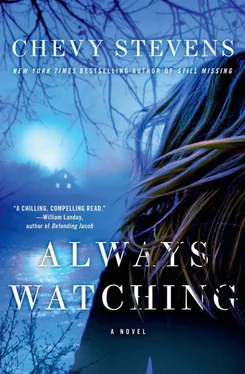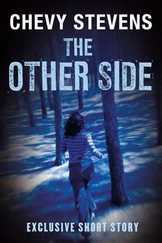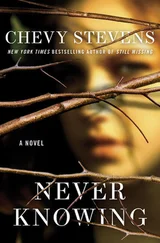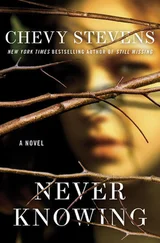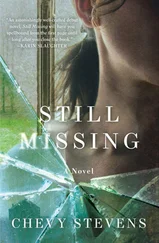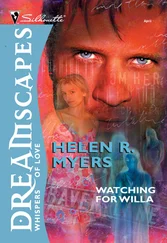I promised Heather and Daniel again that she was safe on the ward and reminded them that anything they shared would help me treat her. Then I finished my rounds and entered my notes on the patients’ charts, all the while trying to ignore the dark feeling closing in around me, the question clamoring in my head.
Could it really be the same people ?
Finally I had finished all my appointments at Mental Health, and my day was over. Each night when I got off work I’d take a detour down Pandora Street, where the homeless camp out, and search for the tall frame of my daughter, Lisa. She was turning twenty-five that March, and I wondered the same things I’d wondered every year since she had packed her bags at eighteen: Would I get to see her? Would she call? In the background there was always the more frightening thought: Would she make it to her next birthday? Each time the phone rang, I’d hold my breath, terrified the police were calling to say they’d found her body.
I parked my car and walked up and down the street, studying the clusters of street kids, wondering if their parents also lay awake at night worrying. It was cold, and I was tired and hungry, but I took another lap around the block, eyeing misshapen lumps sleeping under dirty blankets, straggly, unwashed hair, scarred arms, feeling a surge of hope when I’d see a young woman, followed by a crash of despair when I’d realize it wasn’t Lisa. I had no idea how vast the streets of Victoria were until my child was lost on them. How many dark alleys and abandoned buildings there were, or how helpless it would all make me feel.
When I didn’t find Lisa anywhere, I headed home. I’d moved from Nanaimo, a city about an hour and a half north of Victoria, on the first of December, in the hopes of connecting with her. Back in July, before I’d made the final decision to move, I continued with my practice for a couple of weeks, not wanting to leave my clients without a support system. Once I had referred any remaining clients to an excellent therapist in town, I took the rest of the summer off and traveled. That fall, I’d just put my house on the market, still considering opening a private practice in Victoria, when a job came available for an adult general psychiatrist at St. Adrian’s Hospital. My house sold soon after.
Now it was February, almost two months later, and I was still getting used to Fairfield, my new neighborhood in Victoria, a lovely community with tree-lined streets surrounded by Oak Bay, James Bay, Rockland, Beacon Hill Park, and to the south, the ocean shoreline of the Strait of Juan de Fuca. Normally I took my time, so I could admire all the heritage buildings, but today I was too distracted, and sighed in relief when I pulled in the driveway of my new home.
Set on a street of older Victorian homes, my house was an architect’s funky blend of West Coast natural with Asian contemporary: all strong angles, golden-stained wood exterior on the lower part, steel blue HardiPlank siding on the top half, and broad sheets of glass windows, trimmed in thick white casings. An aluminum roof jutted down in a slash of silver, and there was even a penthouse deck for morning tea. Bamboo in big black ceramic planters lined the front steps and walkway, setting off the amber-stained wood fence and gates with their black hinges. The garage had been turned into a potting shed in the back, perfect for my new hobby—bonsai trees, an art form I’ve long admired and yet to master. I’d taken a class on a lark and ended up finding the discipline extremely relaxing. I spend so much time in my head that it was nice to do something creative for a change. The careful shaping and cultivating of a tree over a long period of time also reminded me to be patient with my clients.
Before I got out of my car, I did a quick check of all my mirrors to make sure no one was lurking in my driveway. I’d been attacked outside my office that summer in Nanaimo—another reason for my move, though I had already been thinking about it. I hadn’t broken any bones but I’d been knocked unconscious and never saw my assailant. A patient at the time had been involved in a situation with her birth father, whom we originally suspected of assaulting me. But as the investigation continued, it seemed less likely. Another of my patients had recently left her husband, who viewed her sessions as an abandonment of her wifely duties—something he communicated with his fist to her face. When her husband confronted me, I refused to tell him where she was staying. A week later, I was attacked. The police couldn’t prove it was him, but I was sure of it.
I let myself into my house, stopping to notice a stray black cat, all skin and bones, saunter across the road and head toward Ross Bay Cemetery. I hoped she had somewhere warm to hide. My last cat, Silky, had passed away in June, and I hadn’t been able to bring myself to adopt another, telling myself it was because I wanted to travel, knowing it was because I wasn’t ready. Inside the safety of my home, I had a bath to wash away the smell of the hospital, put on my favorite dove gray yoga outfit, made a cup of tea, and then, and only then, did I let myself think about what I’d heard at the hospital—and what I was going to do about it.
* * *
My mother had told us that the commune moved down to Victoria not long after we left, and I’d assumed they’d eventually split up. Once, in my early twenties, I’d been driving on the mountain roads with a boyfriend, looking for a good swimming hole, and recognized the old entrance to the commune site. He’d wanted to stop and explore, having heard the rumors about a group of hippies that had camped there. I didn’t divulge that we’d also lived there, but I’d been curious too. We’d walked around the site, now overgrown, and it had felt like visiting a ghost town. The barn and cabins empty, doors hanging open and windows broken, our voices hushed in the still forest. I’d become anxious the closer we got to the river, my heart beating fast and my chest tight, and had made him leave, assuming that it was just the silence and the dark woods that had frightened me.
Under my therapist’s guidance a few years later, I had talked about the months I spent at the commune, sharing memories that I had of the place, the other members, my brother and mother, swimming at the river, the late-night campfires. But I never could recall any specific event that might’ve caused my claustrophobia, and hours of hypnosis never revealed anything further. There was just this murky sense that I hadn’t liked some of the things that the adults were doing, and I’d been uncomfortable around Aaron, the young man I’d met that first day, and Joseph—his younger brother. Sometimes I felt like there might be things I was forgetting, gaps in my timeline, but nothing that I could put my finger on.
Now I couldn’t believe that they were still in Victoria. I was curious about what the commune was like these days and whether the same people lived there.
* * *
That evening I spent some time online, reading about The River of Life Spiritual Center. It didn’t take long to find their Web site, with its mission statement, “Guiding you on your journey to enlightenment.” There were glorious photos of the commune, situated on more than 250 acres of land, where the river joined the ocean. I hadn’t been to Jordan River for years, but I remembered that it was a small community about an hour west of Victoria. Originally a logging camp, there wasn’t much in the way of a village, just a couple of cafés and a general store.
The commune land seemed to be mostly forest and hiking trails, but a big chunk was farmland, part of their stay-and-work program. It sounded like a fascinating place to visit, with its descriptive passages about the healing properties of the land, the intellectual and soul-fulfilling workshops on meditation, spiritual awakening, relationship building, living and dying consciously, blending East and West philosophies toward achieving your highest potential. There were sweat lodges and mineral pools, elaborate gardens, and descriptions of organic food grown on the property, all extolling the virtues of a simple, balanced way of living.
Читать дальше
